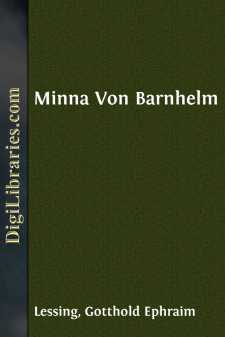Categories
- Antiques & Collectibles 13
- Architecture 36
- Art 48
- Bibles 22
- Biography & Autobiography 813
- Body, Mind & Spirit 142
- Business & Economics 28
- Children's Books 15
- Children's Fiction 12
- Computers 4
- Cooking 94
- Crafts & Hobbies 4
- Drama 346
- Education 46
- Family & Relationships 57
- Fiction 11828
- Games 19
- Gardening 17
- Health & Fitness 34
- History 1377
- House & Home 1
- Humor 147
- Juvenile Fiction 1873
- Juvenile Nonfiction 202
- Language Arts & Disciplines 88
- Law 16
- Literary Collections 686
- Literary Criticism 179
- Mathematics 13
- Medical 41
- Music 40
- Nature 179
- Non-Classifiable 1768
- Performing Arts 7
- Periodicals 1453
- Philosophy 64
- Photography 2
- Poetry 896
- Political Science 203
- Psychology 42
- Reference 154
- Religion 513
- Science 126
- Self-Help 84
- Social Science 81
- Sports & Recreation 34
- Study Aids 3
- Technology & Engineering 59
- Transportation 23
- Travel 463
- True Crime 29
Minna Von Barnhelm
Description:
Excerpt
INTRODUCTORY NOTE
Gotthold Ephraim Lessing was born at Kamenz, Germany, January 22, 1729, the son of a Lutheran minister. He was educated at Meissen and Leipzic, and began writing for the stage before he was twenty. In 1748 he went to Berlin, where he met Voltaire and for a time was powerfully influenced by him. The most important product of this period was his tragedy of "Miss Sara Samson," a modern version of the story of Medea, which began the vogue of the sentimental middle-class play in Germany. After a second sojourn in Leipzic (1755-1758), during which he wrote criticism, lyrics, and fables, Lessing returned to Berlin and began to publish his "Literary Letters," making himself by the vigor and candor of his criticism a real force in contemporary literature. From Berlin he went to Breslau, where he made the first sketches of two of his greatest works, "Laocoon" and "Minna von Barnhelm," both of which were issued after his return to the Prussian capital. Failing in his effort to be appointed Director of the Royal Library by Frederick the Great, Lessing went to Hamburg in 1767 as critic of a new national theatre, and in connection with this enterprise he issued twice a week the "Hamburgische Dramaturgie," the two volumes of which are a rich mine of dramatic criticism and theory.
His next residence was at Wolfenbuttel, where he had charge of the ducal library from 1770 till his death in 1781. Here he wrote his tragedy of "Emilia Galotti," founded on the story of Virginia, and engaged for a time in violent religious controversies, one important outcome of which was his "Education of the Human Race." On being ordered by the Brunswick authorities to give up controversial writing, he found expression for his views in his play "Nathan the Wise," his last great production.
The importance of Lessing's masterpiece in comedy, "Minna von Barnhelm," is difficult to exaggerate. It was the beginning of German national drama; and by the patriotic interest of its historical background, by its sympathetic treatment of the German soldier and the German woman, and by its happy blending of the amusing and the pathetic, it won a place in the national heart from which no succeeding comedy has been able to dislodge it.
or, THE SOLDIER'S FORTUNE
DRAMATIS PERSONAE
MAJOR VON TELLHEIM, a discharged officer.
MINNA VON BARNHELM.
COUNT VON BRUCHSAL, her uncle.
FRANZISKA, her lady's maid.
JUST, servant to the Major.
PAUL WERNER, an old Sergeant of the Major's.
The LANDLORD of an Inn.
A LADY.
An ORDERLY.
RICCAUT DE LA MARLINIERE.
The scene alternates between the Parlour of an Inn, and a Room
adjoining it.
SCENE I.
Just
JUST (sitting in a corner, and talking while asleep).
Rogue of a landlord! You treat us so? On, comrade! hit hard!
(He strikes with his fist, and wakes through the exertion).
Ha! there he is again! I cannot shut an eye without fighting with him.
I wish he got but half the blows. Why, it is morning! I must just look
for my poor master at once; if I can help it, he shall not set foot in
the cursed house again....


